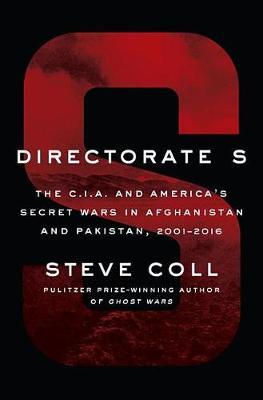America’s war in Afghanistan is the longest war the U.S. has ever fought. Beginning a month after the terrorist attacks of Sept. 11, 2001, the initial mission was to remove the Taliban from power and destroy the al-Qaida terror network. Now, nearly 17 years later, Pulitzer Prize-winning journalist Steve Coll points out in his new book Directorate S: The CIA’s Secret War in Afghanistan and Pakistan, that the war’s goals have changed.
At best the war is a grinding stalemate.
In an interview with NPR News Steve Colls said: “The objective is not a grand peace ceremony on some grand aircraft carrier,” Coll says. “It’s to reduce the violence in Afghanistan, to reduce the suffering of innocents in Kabul, to support the constitutional government that we invested in after Sept. 11 so heavily in money and in American lives and sacrifices on the battlefield.”
Coll’s new book, Directorate S: The C.I.A. and America’s Secret Wars in Afghanistan and Pakistan,is a follow-up to his Pulitzer Prize-winning Ghost Wars, which documented U.S. involvement in the region starting with the 1979 Soviet invasion of Afghanistan until Sept. 10, 2001.
The new book — whose title is taken from the name of the Pakistani spy wing providing covert support to the Taliban — chronicles U.S. efforts in Afghanistan and Pakistan since Sept. 11, 2001. Coll warns that an end to the war is not in sight.
“Most of the generals … say in public, ‘There’s no military solution to this war,'” Coll says. “This is at best a grinding stalemate. And yet, we prioritize military action at the expense of diplomacy, at the expense of negotiating.”
Interview Highlights
On the current state of the war in Afghanistan
We’re in a stalemate. We’re in a muddle. We have something like 10,000 troops there, maybe growing a little higher over the next year or so.
There are actually two wars that we’re fighting in Afghanistan, I’m not sure most Americans appreciate that. One is a direct combat war against remnants or elements of the Islamic State that have popped up in eastern Afghanistan. There President Obama initiated, and President Trump continued, a return to direct combat in Afghanistan, after previously, at the end of 2014, saying we were done with the war.
The second war is the one that we transitioned to in 2014, which is to advise and assist the Afghan security forces — the Afghan army and police — in their combat against the Taliban, an indigenous Afghan movement that we’re all too familiar with after all these years, which controls significant swaths of the Afghan countryside.
So our muddled war policy is that we’re directly at war with the Islamic State, but we’re not directly at war with the Taliban, except to the extent that we’re supporting Afghan forces. But what that means as a practical matter is that we’re their air force; we have the planes. So when the Afghan forces need bombs dropped on Taliban positions, that’s generally us doing the bombing. The number of bombs that we’ve been dropping on Afghanistan has increased significantly in 2017 over the year before.
On why Pakistan supports the Taliban
Pakistan’s generals seemed to conclude … that Afghanistan was going to become an ally of India with international backing [and] that they needed to encourage the Taliban support. …
So this starts around 2004, 2005, it really gets serious. … Around that time, the Bush administration cut a really big agreement with India about its nuclear program. We basically forgave India for having a nuclear weapons program and offered significant nuclear assistance. We told Pakistan at the same time, “You’re not going to get that deal. You’re too much of a rogue state. You sell weapons abroad without permission. Anyway, we don’t trust you enough.”
And it was around that time that the high command in Pakistan really thought, “You know what? The Americans are not reliable. They’re really going all-in with India, our archenemy. The Americans are saying they’re going to leave Afghanistan. They’re really concentrating on their war in Iraq. Let’s get back to work finding a way to have influence in Afghanistan through the Taliban.”
And that’s when the war really started to deteriorate, and we did not see it coming.





